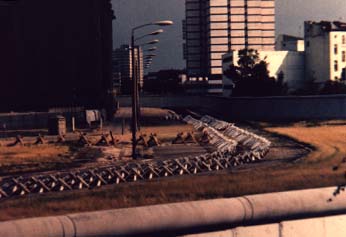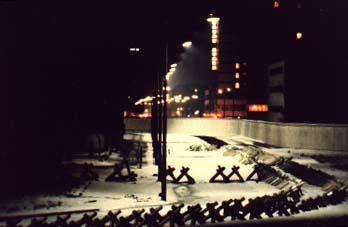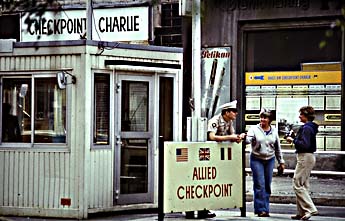My first sight of this was on a train from Hamburg to West Berlin. An East German train: the notices read Do Not Lean Out Of The Window in German and Russian. The train travelled through East German territory with no scheduled stop. When we passed through a station, the platforms next to our track would be empty, and there would be soldiers on guard just in case. No-one from the East could get on our train, on pain of death. I mean that: death.


I made a second visit to Berlin, with two colleagues: Wolfgang, German-born but naturalized Danish (just as well, otherwise he couldn't have come through the same checkpoint), and Phil, from Tennessee. We drove there in Phil's old Renault. Actually it wasn't really old, but it didn't take so well to Phil's American way of thinking that putting gas in the tank was all you needed to do to a car. We drove in to East Berlin for the day. It was great in a way: all the cars were back in the West, and all the parking spaces were in the East. When we came to drive back to the West, we had to go through the famous Checkpoint Charlie exit. One car at a time was allowed through. We stopped at the start of the checkpoint area and got out. The checkpoint was 100 metres long, with a curve in the road and huge gates, machine-gun towers, etc. While we had our passports checked to make sure that we really had the right to leave, soldiers searched the car for stowaways. They looked under the seats, in the back, in the front, and underneath the car with a mirror on a trolley. They opened the fuel cap and inserted a measured rod to make sure that it was a full-size tank, with no secret compartment. Finally they let us go. But we couldn't! Phil's car had stood too long in the open in Berlin's December cold, and it wouldn't start. So while Phil steered, Wolfgang and I PUSHED the car through Checkpoint Charlie in the snow, with all eyes (and gun barrels) in the watchtowers on us, and I suppose the cameras on the West side. That's the longest hundred yards I've ever pushed a car.
 There
was more to come. We drove across the transit route to West Germany. Looked
like a normal road in the real world, but for us there was nothing off
the road. We weren't allowed to leave it, or to stop. On a country section
we did stop though: pressure of Berlin beer forced it. So we piled out
to take a hasty leak at the side of the road, and it must have been then
that Phil's wallet dropped out of his pocket. We didn't find out until
we had left East Germany. In the East all the blazing electric light was
on the border fences; but in the West it was on the Christmas trees and
in the bars. We stopped at the first one we came to (bar, not tree), but
Phil couldn't pay...no wallet. Oops. We drove the short distance back
to the Western checkpoint, to report the loss just in case it was found
by a saint, but they said they had no communication with their Eastern
counterparts; we'd have to drive back to the Eastern checkpoint, visible
less than a kilometre farther on. We did: first we met a soldier with
a rifle, who demanded our passports. We're not coming in, we said, we
just want to report a loss. No, we did it his way. First we showed all
our passports, then he went in to report it. Out came an officer, a major
if I'm not mistaken, and listened to our story (we had stopped once on
the road because we thought our lights were badly adjusted...). Are you
sure you didn't drop it inside the car, he asked. Sure, we said, we've
looked everywhere. Let us try, he said, we have more experience (did I
see a slight smile?). He called out a couple of privates, and they looked
all through the car. Pretty damn well, I have to say. So we completed
a form anyway (Wolfgang speculated that the Major would go back to look
for it: the US dollars would buy a few pairs of Levi's in the duty-free
stores in Berlin). Then we had to turn round and check out of East Germany
again, which would mean a long queue: but the Major, seeing that not only
had we not really been in the East but that he had just searched our car
anyway, kindly gave us a laissez-passer. So we turned on to the exit road
and breezed right up to the guards, showed our paper, and were waved through!
This must be what it was like for the Politburo. Now that's all gone;
at last. You can still find places where people in uniform will point
guns at your back (not least in France if you're the wrong color), but
the creepy feeling of always being on the edge of real trouble was a feeling
that was very wearing.
There
was more to come. We drove across the transit route to West Germany. Looked
like a normal road in the real world, but for us there was nothing off
the road. We weren't allowed to leave it, or to stop. On a country section
we did stop though: pressure of Berlin beer forced it. So we piled out
to take a hasty leak at the side of the road, and it must have been then
that Phil's wallet dropped out of his pocket. We didn't find out until
we had left East Germany. In the East all the blazing electric light was
on the border fences; but in the West it was on the Christmas trees and
in the bars. We stopped at the first one we came to (bar, not tree), but
Phil couldn't pay...no wallet. Oops. We drove the short distance back
to the Western checkpoint, to report the loss just in case it was found
by a saint, but they said they had no communication with their Eastern
counterparts; we'd have to drive back to the Eastern checkpoint, visible
less than a kilometre farther on. We did: first we met a soldier with
a rifle, who demanded our passports. We're not coming in, we said, we
just want to report a loss. No, we did it his way. First we showed all
our passports, then he went in to report it. Out came an officer, a major
if I'm not mistaken, and listened to our story (we had stopped once on
the road because we thought our lights were badly adjusted...). Are you
sure you didn't drop it inside the car, he asked. Sure, we said, we've
looked everywhere. Let us try, he said, we have more experience (did I
see a slight smile?). He called out a couple of privates, and they looked
all through the car. Pretty damn well, I have to say. So we completed
a form anyway (Wolfgang speculated that the Major would go back to look
for it: the US dollars would buy a few pairs of Levi's in the duty-free
stores in Berlin). Then we had to turn round and check out of East Germany
again, which would mean a long queue: but the Major, seeing that not only
had we not really been in the East but that he had just searched our car
anyway, kindly gave us a laissez-passer. So we turned on to the exit road
and breezed right up to the guards, showed our paper, and were waved through!
This must be what it was like for the Politburo. Now that's all gone;
at last. You can still find places where people in uniform will point
guns at your back (not least in France if you're the wrong color), but
the creepy feeling of always being on the edge of real trouble was a feeling
that was very wearing.